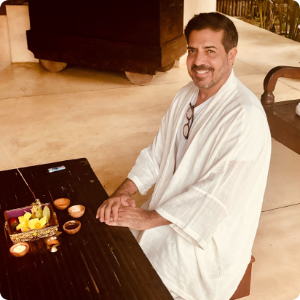"Everything Happens for a Reason"... Or Does It?
Jun 06, 2025
As we continue this conversation around forgiveness it’s important to take a step back and see the big picture, not just focus on the individual moment where things went sideways.
The causal stream – cause and effect – can have such a history to it (and by definition it does) that the events that led to the incident that upset you could have been started decades and decades ago. And you happen to be one of the dominoes in this particular stream.
Where is the ultimate accountability if the causality has been started well before either person even came together?
Now we all have said this: “everything happens for a reason.” And I wanted to put a little color on it. Because when we deal with it in a framework of accountability and responsibility (which is what we do here at MindTravel, as you all know) it's important to apply that even to statements like this.
On the one hand, yes, we may not know the original cause, that causal stream. But we don't actually have to know what it is in order to forgive and turn that situation into a useful one or a growth opportunity.
But we want to stay away from something that lies outside of ourselves, that is intervening, because I believe in that situation we are relinquishing empowerment. By doing so, we're relinquishing part of our freedom in that.
So the way I like to think of it is that everything happens for a reason… that we choose.
I find this to be a very empowering mindset. I can find the reason for it, because I'm taking action that is going to turn the situation – one that may be tragic, horrific, difficult, challenging – and I am going to choose to morph it, to navigate with it into a direction that is going to work for me and those in my life.
This leads us to the idea of forgiveness as a process, and not a destination in and of itself. No matter what we might like to believe, the situation we’re forgiving always stays with us in some healthy or unhealthy capacity. We think of everything in a binary context, but actually everything is much better understood as a spectrum.
If we apply the spectrum here we realize that there's an immediate impact and also a long-term impact. And sometimes the longer-term impact is unknown to us. We may not realize that we haven't resolved all of it. So the hidden consciousness that we have may unveil some hurt that emerges later on or gets triggered later on. We should be prepared for that, because it’s totally natural and totally normal.
It just means that we have to have a more open context, a more open framework for the situation that we're dealing with.
So this is the idea of ongoing forgiveness: that forgiveness is not a one-time thing. The conversation may be one time, the exploration with someone may be one time, but forgiveness as a process is ongoing.
Have you ever had an experience like this? Did you suspect that maybe the issue hadn’t been fully resolved or did it catch you completely unawares?
How did you resolve it? Did you resolve it? Let’s discuss!


